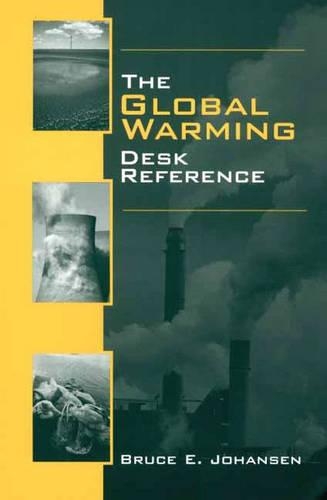
The Global Warming Desk Reference
(Hardback)
Publishing Details
The Global Warming Desk Reference
By (Author) Bruce E. Johansen
Bloomsbury Publishing PLC
Greenwood Press
30th October 2001
United States
Classifications
Tertiary Education
Non Fiction
Reference works
363.73874
Physical Properties
Hardback
376
Description
With global temperatures rising rapidly during the past quarter century, "infrared forcing," popularly known as the "greenhouse effect," has attracted worldwide concern. This book is a college-level compendium of the research on global warming. It surveys the scientific consensus on the issue, describes recent findings, and also considers the arguments of sceptics who doubt that global warming is a threat. Suggesting that the effects of global warming can be seen in the melting of glaciers and the dying of coral reefs, the work summarizes the potential impact on human health and on plants and animals worldwide. Concluding with possible solutions, the book contains comprehensive bibliography on the subject. A growing field of study with a rapidly expanding literature, global warming should be of interest to everyone on Earth. Evidence of the greenhouse effect, due to emissions of carbon dioxide and other trace gases, has been accumulating for a quarter century. This book covers both research from scientific journals and newspaper and magazine reports of present-day evidence.
Reviews
[A] useful compendium of recent research that can guide readers into the larger literature on climate change.-Environment
Does this book advance the climate debate The answer, I think, is a qualified yes. There are enough good things inside to justify its use by students and professionals as well as general readers.-Bulletin of the American Meteorological Society
Intended for undergraduates, this is an accessible book that gives a comprehensive overview of the widely discussed topic of global warming.-Bulletin of the American Meteorological Society
Johansen has his finger on the pulse of global climate change as he traverses the hot-button topics now prominent in popular and scientific media....this research reference handbook offers a concise survey of the climate change problem....All levels.-Choice
The Global Warming Desk Reference fills an important niche, providing a well-researched and well-written overview of what we know about the phenomena of global climate change and the greenhouse effect. Highly recommended for high school, public, and academic libraries.-Reference & User Services Quarterly
Undergraduates will find this book easy to read and overflowing with information...it is highly recommended as an addition to any reference collection either in an academic or public setting.-E-STREAMS
"A useful compendium of recent research that can guide readers into the larger literature on climate change."-Environment
"[A] useful compendium of recent research that can guide readers into the larger literature on climate change."-Environment
"Does this book advance the climate debate The answer, I think, is a qualified yes. There are enough good things inside to justify its use by students and professionals as well as general readers."-Bulletin of the American Meteorological Society
"Intended for undergraduates, this is an accessible book that gives a comprehensive overview of the widely discussed topic of global warming."-Bulletin of the American Meteorological Society
"Johansen has his finger on the pulse of global climate change as he traverses the hot-button topics now prominent in popular and scientific media....this research reference handbook offers a concise survey of the climate change problem....All levels."-Choice
"Undergraduates will find this book easy to read and overflowing with information...it is highly recommended as an addition to any reference collection either in an academic or public setting."-E-STREAMS
"The Global Warming Desk Reference fills an important niche, providing a well-researched and well-written overview of what we know about the phenomena of global climate change and the greenhouse effect. Highly recommended for high school, public, and academic libraries."-Reference & User Services Quarterly
Author Bio
BRUCE E. JOHANSEN is Robert T. Reilly Professor of Communication and Native American Studies at the University of Nebraska, Omaha./e He has written on modern industrialism's toll on Native Americans in Ecocide of Native America (1995) and has written on environmental themes in The Nation, The Progressive, and The Washington Post.
